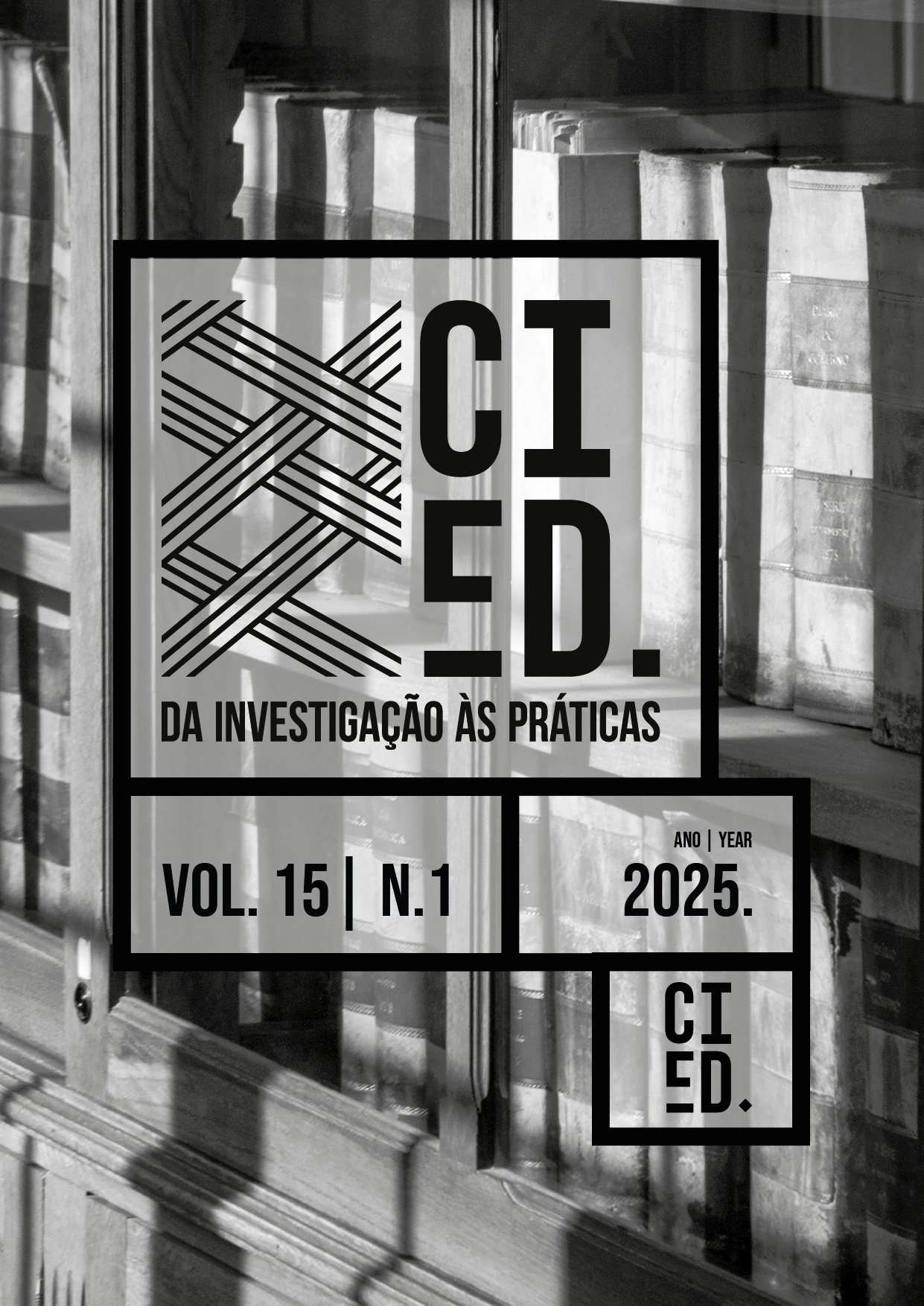Integration between the theory of didactic situations and maker education in a formative perspective
DOI:
https://doi.org/10.25757/invep.v15i1.439Keywords:
Teacher Training, Didactic Engineering, Formative Didactic Situation, Maker EducationAbstract
The Theory of Didactic Situations (TDS), developed by Guy Brousseau in France, is a methodology that analyzes the social interactions among students, teachers, and mathematical knowledge in the classroom, influencing learning and its dynamics. This study aimed to investigate how the dialectical phases of TDS impact teacher training in a maker education context. Using Didactic Engineering as a research methodology, data were collected during the a priori analysis and experimentation phases and later analyzed through qualitative and quantitative approaches. The training was conducted in five sessions involving seven teachers in the fields of mathematics and physics. The results showed that even teachers with no prior experience in TDS and maker education demonstrated significant progress, comparable to that of an experienced teacher in these methodologies. The integration of TDS’s dialectical phases—action, formulation, validation, and institutionalization—provided a conducive environment for critical reflection and creative application of knowledge. It is concluded that maker training based on TDS enriches pedagogical practice and promotes more dynamic and effective teaching. However, post-training follow-up, such as reinforcement sessions and individualized guidance, may offer continuous support to teachers in implementing TDS and Maker Education in their teaching practices.
Downloads
References
Artigue, M. (1998). Ingénierie didactique. Recherches en Didactique des Mathématiques, 9(3), 281–308. Recuperado de http://kleio.ch/HEP_VS/hepvsvideo/8_INGENIERIE_DIDACTIQUE_ARTIGUE.pdf
Bandoni, A. (2016). Já não se fazem objetos como antigamente. In V. F. Megido (Org.), A revolução do design: Conexões para o século XXI (pp. 50–61). São Paulo: Editora Gente.
Blikstein, P., Valente, J., & Moura, E. M. (2020). Educação maker: Onde está o currículo? Revista e-Curriculum, 18(2), 532–544. Recuperado de https://revistas.pucsp.br/curriculum/article/view/48127
Brasil. Ministério da Educação. (2017). Base Nacional Comum Curricular. Brasília: MEC. Recuperado de http://basenacionalcomum.mec.gov.br/
Brousseau, G. (1986). Fondements et méthodes en didactique des mathématiques. Recherches en Didactique des Mathématiques, 7(2), 35–115. Recuperado de https://revue-rdm.com/1986/fondements-et-methodes-de-la/
Brousseau, G. (2008). Introdução ao estudo das situações didáticas: Conteúdos e métodos de ensino (C. Bórgea, Trad.). São Paulo: Ática.
Douady, R. (1984). Jeux de cadres et dialectique outil-objet dans l’enseignement des mathématiques: Une réalisation dans tout le cursus primaire (Tese de doutorado). Université Paris VII. Recuperado de https://theses.hal.science/tel-01250665
Hatch, M. (2013). The maker movement manifesto: Rules for innovation in the new world of crafters, hackers, and tinkerers.
Likert, R. (1932). A technique for the measurement of attitudes. Archives of Psychology, 22(140), 1–55. Recuperado de https://archive.org/details/likert-1932/page/8/mode/2up
Lima, L. P. F., Lima, G. P. F., Menezes, D. B., & Vasconcelos, F. H. L. (2024a). Fabricação digital de experimentos físicos por meio da STEAM. Contribuciones a las Ciencias Sociales, 17(3), e5545. https://doi.org/10.55905/revconv.17n.3-165
Lima, L. P. F., Abreu, F. G. S., Menezes, D. B., & Vasconcelos, F. H. L. (2024b). Time of basic education teachers training in maker activities: A meta-analysis. Global Journal of Human-Social Science, 24(G2), 93–106. Recuperado de https://socialscienceresearch.org/index.php/GJHSS/article/view/104019
Lima, L. P. F., Menezes, D. B. & Vasconcelos, F. H. L. (2024c). Formação maker de professores: competências desenvolvidas via engenharia didática. ACTIO, 9(3), 1-24. https://doi.org/10.3895/actio.v9n3.19194
Millar, R. (2003). Towards a science curriculum for public understanding. Ensino Pesquisa Educação Ciência, 5(2), 139–154. https://doi.org/10.1590/1983-21172003050206
Nascimento, F., Fernandes, H. L., & Mendonça, V. M. (2012). O ensino de ciências no Brasil: História, formação de professores e desafios atuais. Revista HISTEDBR On-line, 10(39), 225–249. https://doi.org/10.20396/rho.v10i39.8639728
Perrin-Glorian, M. J., & Bellemain, P. M. B. (2019). L’ingénierie didactique entre recherche et ressource pour l’enseignement et la formation des maîtres. Caminhos da Educação Matemática em Revista Online, 9(1). Recuperado de https://periodicos.ifs.edu.br/periodicos/caminhos_da_educacao_matematica/article/view/298
R Core Team. (2023). R: A language and environment for statistical computing (Versão 4.1) [Software de computador]. Recuperado de https://cran.r-project.org
Raabe, A. L. A., Santana, A. L. M., & Burd, L. (2016). Lite Maker: Uma estação móvel que possibilita transformar a sala de aula em espaço maker. In 1ª Conferência FabLearn Brasil. Recuperado de https://fablearn.org/wp-content/uploads/2016/09/FLBrazil_2016_paper_149.pdf
Seixas, R. H. M., Calabró, L., & Sousa, D. O. (2017). A formação de professores e os desafios de ensinar ciências. Revista Thema, 14(1), 289–303. https://doi.org/10.15536/thema.14.2017.289-303.413
Silva, A. F., Ferreira, J. H., & Vieira, C. A. (2017). O ensino de ciências no ensino fundamental e médio: Reflexões e perspectivas sobre a educação transformadora. Revista Exitus, 7(2), 283–304. Recuperado de http://educa.fcc.org.br/scielo.php?script=sci_arttext&pid=S2237-94602017000200283
Silveira, F. (2016). Design & educação: Novas abordagens. In V. F. Megido (Org.), A revolução do design: Conexões para o século XXI (pp. 116–131). São Paulo: Editora Gente.
The Jamovi Project. (2023). jamovi (Versão 2.4) [Software de computador]. Recuperado de https://www.jamovi.org
Valente, J. A., & Blikstein, P. (2019). Maker education: Where is the knowledge construction? Constructivist Foundations, 14(3), 252–262. Recuperado de https://tltlab.org/wp-content/uploads/2019/10/2019.Valente-Blikstein.Constructivist-Foundations.Maker-Education.pdf
Downloads
Published
How to Cite
Issue
Section
License
Copyright (c) 2025 Luiz Paulo Fernandes Lima, Daniel Brandão Menezes, Francisco Herbert Lima Vasconcelos

This work is licensed under a Creative Commons Attribution 4.0 International License.
Articles published or submitted to Da Investigação às Práticas are licensed according to Creative Commons Attribution License (CC BY 4.0). Authors agree that:
Copyrights of all articles published are retained by authors with first publication copyright granted to the journal.
All articles are under the Creative Commons Attribution License recognizing the authorship of the publication and identifying that first publication took place in this journal.
Authors have the right to free distribute or make available in private or institutional pages the version published by Da Investigação às Práticas: Estudos de Natureza Educacional provided the original proper citation.
The journal only accepts articles not published previously (except in the form of an abstract or as part of academic thesis), that it is not under consideration for publication elsewhere. After published, the article cannot be published again partial or totally without the editorial board consent.





 e-ISSN: 2182-1372
e-ISSN: 2182-1372